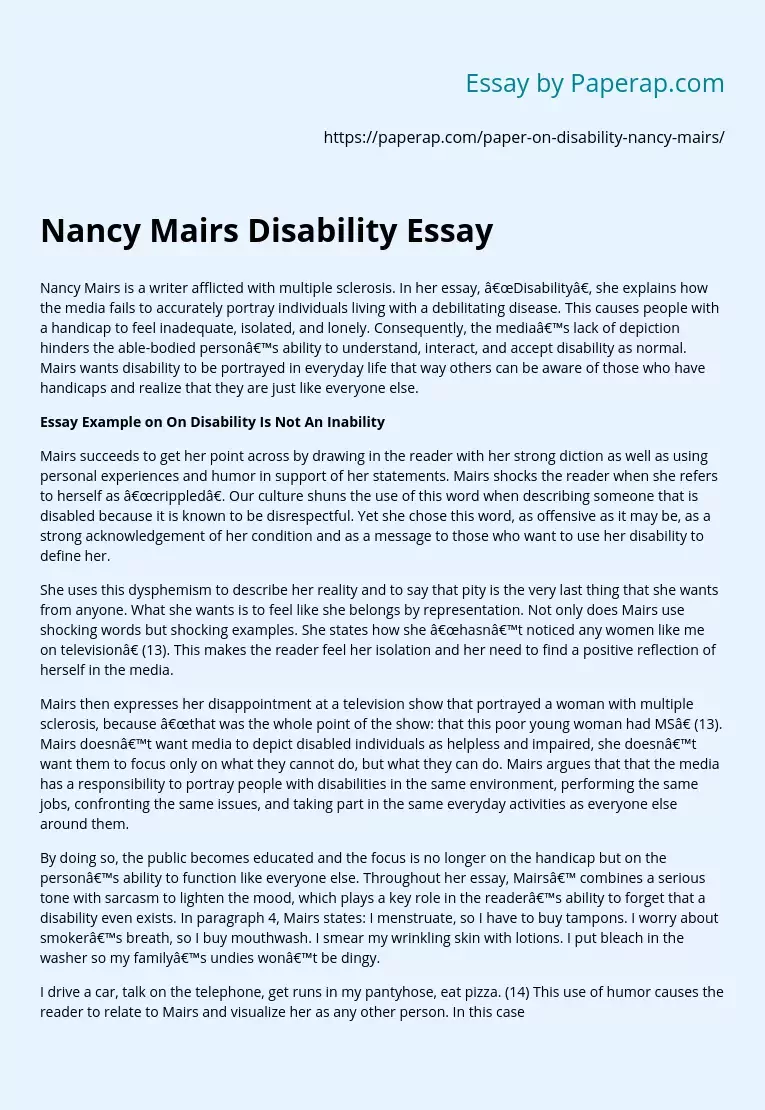Nancy Mairs Disability Essay
Nancy Mairs is a writer afflicted with multiple sclerosis. In her essay, “Disability”, she explains how the media fails to accurately portray individuals living with a debilitating disease. This causes people with a handicap to feel inadequate, isolated, and lonely. Consequently, the media’s lack of depiction hinders the able-bodied person’s ability to understand, interact, and accept disability as normal. Mairs wants disability to be portrayed in everyday life that way others can be aware of those who have handicaps and realize that they are just like everyone else.
Essay Example on On Disability Is Not An Inability
Mairs succeeds to get her point across by drawing in the reader with her strong diction as well as using personal experiences and humor in support of her statements. Mairs shocks the reader when she refers to herself as “crippled”. Our culture shuns the use of this word when describing someone that is disabled because it is known to be disrespectful. Yet she chose this word, as offensive as it may be, as a strong acknowledgement of her condition and as a message to those who want to use her disability to define her.
She uses this dysphemism to describe her reality and to say that pity is the very last thing that she wants from anyone. What she wants is to feel like she belongs by representation. Not only does Mairs use shocking words but shocking examples. She states how she “hasn’t noticed any women like me on television” (13). This makes the reader feel her isolation and her need to find a positive reflection of herself in the media.
Mairs then expresses her disappointment at a television show that portrayed a woman with multiple sclerosis, because “that was the whole point of the show: that this poor young woman had MS” (13). Mairs doesn’t want media to depict disabled individuals as helpless and impaired, she doesn’t want them to focus only on what they cannot do, but what they can do. Mairs argues that that the media has a responsibility to portray people with disabilities in the same environment, performing the same jobs, confronting the same issues, and taking part in the same everyday activities as everyone else around them.
By doing so, the public becomes educated and the focus is no longer on the handicap but on the person’s ability to function like everyone else. Throughout her essay, Mairs’ combines a serious tone with sarcasm to lighten the mood, which plays a key role in the reader’s ability to forget that a disability even exists. In paragraph 4, Mairs states: I menstruate, so I have to buy tampons. I worry about smoker’s breath, so I buy mouthwash. I smear my wrinkling skin with lotions. I put bleach in the washer so my family’s undies won’t be dingy.
I drive a car, talk on the telephone, get runs in my pantyhose, eat pizza. (14) This use of humor causes the reader to relate to Mairs and visualize her as any other person. In this case, Mairs would be an “advertisers’ dream: Ms. Great American Consumer,” as she states in paragraph 4. But, advertisers never choose someone like Mairs to advertise their products because as she describes it, “to depict disabled people in the ordinary activities of daily life is to admit that there is something ordinary about disability itself” (14).
This proves that people can’t accept the fact that disability is ordinary. It explains why handicaps are being ignored and excluded from the media. Mairs uses effective skills of writing to engage the reader in her personal life as a disabled woman. She is able to grab the reader’s attention with her shocking word choice and clearly relate her message by sharing specific life experiences and issues with some humor. Mairs wants her readers to know that understanding disabilities helps both the abled and disabled.
To prevent an environment of intolerance, ignorance and pity towards those we believe to be inferior, the physically disabled should be integrated in the media with able-bodied individuals and shown openly and fully participating in and performing ordinary activities of daily life. Mairs believes this type of exposure can help change the mindset of many about those with disabilities and can lead to it being accepted as a normal characteristic.
Nancy Mairs Disability Essay. (2019, Nov 27). Retrieved from https://paperap.com/paper-on-disability-nancy-mairs/

